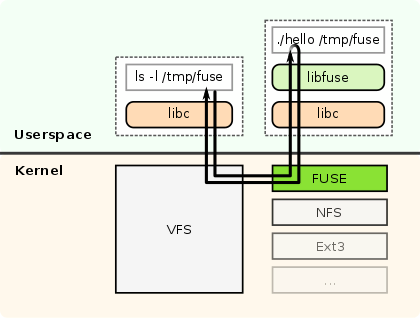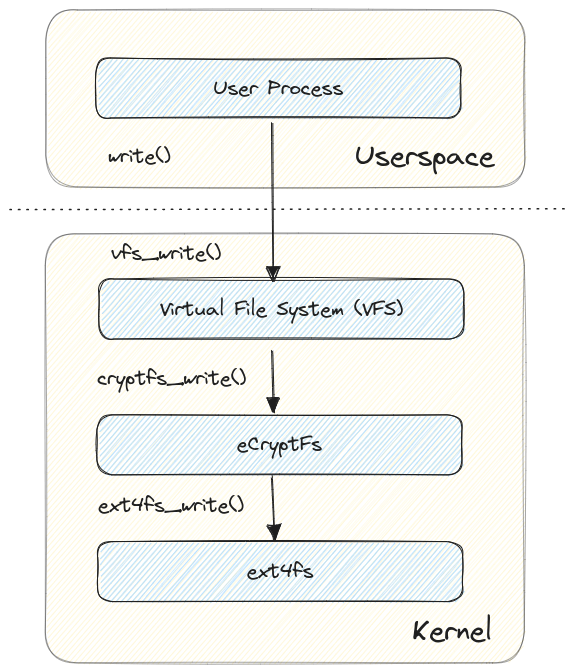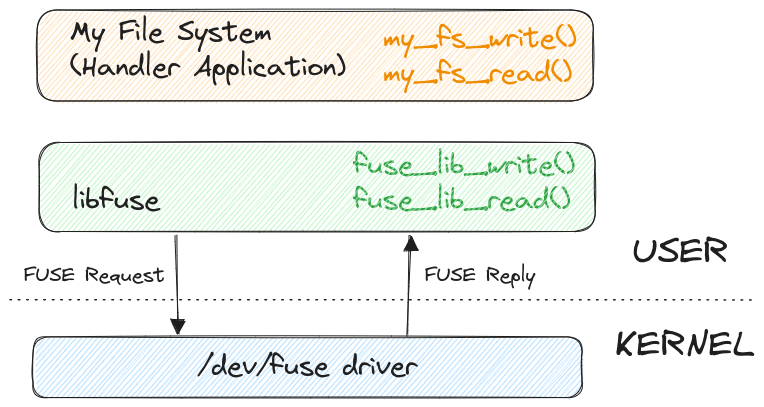FUSE allows clients to create their own filesystem in the user space without affecting or editing the kernel code in the Unix or Unix-like systems.
 Photo by Cristina Gottardi Unsplash
Photo by Cristina Gottardi Unsplash
With the help of the FUSE, no file system internals or kernel module programming knowledge are required. We can easily implement our own file system.
FUSE consists of three components:
fuse.ko: Kernel module that is maintained with kernel code.libfuse: Helper library/API for communication with the kernel module fuse.kofusermount: Mount utility for the FUSE fs.
Table of Contents
Open Table of Contents
How It Works
For implementing a new file system with FUSE, a handler application is required that links with the library libfuse
For example, if we create a file system at /tmp/fuse:
- A User executes
ls -l /tmp/fusefor listing files in the directory. - This command is redirected to the kernel’s VFS
- FUSE sends the command to the registered program
handlerby usinglibfuseas a bridge. - The
handlersends the response back to FUSE overlibfusethen FUSE sends the response to the user using VFS.
 Image from Wikipedia
Image from Wikipedia
In the initiation, fuse.ko kernel module registers three file systems in the VFS:
fuse: Stackable file systems like NFS, ecryptfs, etc.fuseblk: Created for the block file systems.fusectl: Assures monitoring of the state of the FUSE file system and managing it.
What is Stackable Filesystem?
In stackable file systems, data is not held by the file system itself instead another file system is used. (like delegation). It is like an abstraction that gets in the way of another filesystem. Stackable filesystems can be used for automatic encryption, compression, etc.
In the example below, the virtual file system ecryptfs is used for automatic data encryption when writing to disk.
ecryptfs is using the ext4 file system under the hood.
 Stackable Filesystem
Stackable Filesystem
The libfuse library provides functionality for mounting, unmounting the filesystem,
reading messages from the kernel module, sending the response back to the kernel module, etc.
There are two different types of APIs in the libfuse:
- High-level synchronous
- Low-level asynchronous (Communicated directly to the kernel module)
The handler application runs as a daemon generally.
Example FUSE applications: sshfs, ecryptfs
Creating a file system with FUSE, we should implement the fuse_operation struct for creating a file system with FUSE.
(See Also: Struct fuse_operations)
struct fuse_operations {
int (*getattr) (const char *, struct stat *);
int (*readlink) (const char *, char *, size_t);
int (*getdir) (const char *, fuse_dirh_t, fuse_dirfil_t);
int (*mknod) (const char *, mode_t, dev_t);
int (*mkdir) (const char *, mode_t);
int (*unlink) (const char *);
int (*rmdir) (const char *);
int (*symlink) (const char *, const char *);
int (*rename) (const char *, const char *);
int (*link) (const char *, const char *);
int (*chmod) (const char *, mode_t);
int (*chown) (const char *, uid_t, gid_t);
int (*truncate) (const char *, off_t);
int (*utime) (const char *, struct utimbuf *);
int (*open) (const char *, struct fuse_file_info *);
int (*read) (const char *, char *, size_t, off_t, struct fuse_file_info *);
int (*write) (const char *, const char *, size_t, off_t,struct fuse_file_info *);
int (*statfs) (const char *, struct statfs *);
int (*flush) (const char *, struct fuse_file_info *);
int (*release) (const char *, struct fuse_file_info *);
int (*fsync) (const char *, int, struct fuse_file_info *);
int (*setxattr) (const char *, const char *, const char *, size_t, int);
int (*getxattr) (const char *, const char *, char *, size_t);
int (*listxattr) (const char *, char *, size_t);
int (*removexattr) (const char *, const char *);
};Implementation for all functions of the struct is not necessary but they are required for our file system to work correctly.
We can select the FUSE version with macro #define FUSE_VERSION 22
Kernel module fuse.ko communicates with the libfuse using the character device /dev/fuse:

What are alternatives to FUSE?
- LUFS
- UserFS
- Ufo Project
- OpenAFS
- CIFS
Thanks for reading …